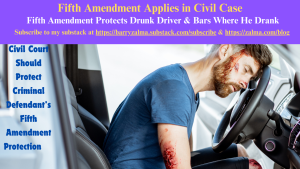Fifth Amendment Applies in Civil Case

Post 4909
See the full video at https://rumble.com/v5i6q5n-fifth-amendment-applies-in-civil-case.html and at https://youtu.be/BPfql1VMFSw
Plaintiffs sued Taylor Brock Peters for injuries they sustained when his vehicle rear-ended theirs. Peters was also charged with the crime of intoxication assault. During discovery, the trial court ordered Peters to identify the bars that had served him alcohol, rejecting his assertion of the Fifth Amendment privilege against self-incrimination. Peters took the issue to the Supreme Court of Texas to protect his Fifth Amendment Right Against self-incrimination in In re Taylor Brock Peters, Relator, No. 23-0611, Supreme Court of Texas (October 4, 2024)
FACTS
Austin police received multiple 911 calls about a crash on the IH 35 service road. When officers arrived on scene, they found that a Toyota Tacoma driven by Peters had crashed into the back of a Toyota 4Runner occupied by two brothers, Constantino Palma, Jr. and E.P., a minor, while the 4Runner was stopped at a red light. Peters’ vehicle struck theirs with such force that the 4Runner’s tailgate was shoved through the cargo compartment into the second-row seating area. The Palmas were transported to a hospital where they were treated for multiple fractures and internal injuries. E.P. was intubated and treated for a skull fracture and brain hemorrhage.
Peters was also admitted to a hospital. Shortly after his arrival, Officer Andrew Upton found Peters in his room, confined to a hospital bed with facial swelling and a bandaged forehead. His clothes were soiled and his eyes bloodshot. Peters told Upton that he had been at two bars whose names he could not remember, that he drank only three beers, and that he remembered being “buzzed” and then trying to drive home. Upton administered a preliminary breath test, which showed that Peters had a blood-alcohol concentration of 0.196. Peters was arrested and charged with two counts of intoxication assault with a motor vehicle.
THE CIVIL SUIT
The Palmas sued Peters for negligence and gross negligence. The Palmas sought the names of the bars that had served Peters alcohol in order to initiate a timely dram shop action. Peters refused to provide information and invoked his Fifth Amendment rights. The trial court granted the Palmas’ motion to compel, and the court of appeals denied Peters mandamus relief.
ANALYSIS
The Fifth Amendment states that “[n]o person . . . shall be compelled in any criminal case to be a witness against himself.” [U.S. CONST. amend. V.] The privilege against self-incrimination applies to testimony that could directly incriminate a witness or furnish an evidentiary link that might tend to incriminate him.
The trial court must be satisfied that the witness’s refusal to answer is based upon his good faith and is justifiable under all of the circumstances.
The Palmas contended that the assertion of the privilege interferes with the workings of the civil justice system. The answers they seek are critical, they argue, because Peters’ silence effectively bars their potential dram shop action. In Texas a valid assertion of the privilege prevails over the civil justice system’s needs.
The Supreme Court concluded that compelling Peters’ answers could furnish a link in the chain of proof that might tend to incriminate him. Peters’ fears that his compelled responses might be used against him in a criminal case are not imaginary. The State of Texas is prosecuting him on the very same facts that underlie this civil case. Courts should be loath to second-guess the privilege’s application. The Palmas argued that even if the privilege would otherwise apply, Peters waived it by disclosing to Officer Upton that he had visited two bars, drank three beers, and felt buzzed.
Upton’s arrest affidavit notes that Peters was “[c]onfused” and “[d]isoriented.” It states that Upton interrogated Peters while he was “confined to [a] hospital bed,” with a “cut on his forehead that was causing swelling around his face.”
Peters faces a reasonable danger of incrimination from disclosing his whereabouts before the collision. The Supreme Court conditionally granted mandamus relief and directed the trial court to vacate the part of its order granting the motion to compel and to then deny the motion as to those interrogatories.
Every person facing a criminal charge in the United States may not be compelled to be a witness against himself. Telling the plaintiffs in a civil suit the bars where he consumed alcohol before the accident would allow both the plaintiffs and the prosecutors to establish how much alcohol he consumed at each bar. The plaintiff may find a civil dram shop act against him and the state will have the opportunity to prove the crimes for which he was charged since they will not be able to use at a criminal trial his confused statements made to the officer which was probably not made willingly and with appropriate notice.
 (c) 2024 Barry Zalma & ClaimSchool, Inc.
(c) 2024 Barry Zalma & ClaimSchool, Inc.
Please tell your friends and colleagues about this blog and the videos and let them subscribe to the blog and the videos.
Subscribe to my substack at https://barryzalma.substack.com/subscribe
Go to X @bzalma; Go to Newsbreak.com https://www.newsbreak.com/@c/1653419?s=01; Go to Barry Zalma videos at Rumble.com at https://rumble.com/account/content?type=all; Go to Barry Zalma on YouTube- https://www.youtube.com/channel/UCysiZklEtxZsSF9DfC0Expg
Go to the Insurance Claims Library – https://lnkd.in/gwEYk
Like this:
Loading…
Related
About Barry Zalma
An insurance coverage and claims handling author, consultant and expert witness with more than 48 years of practical and court room experience.







